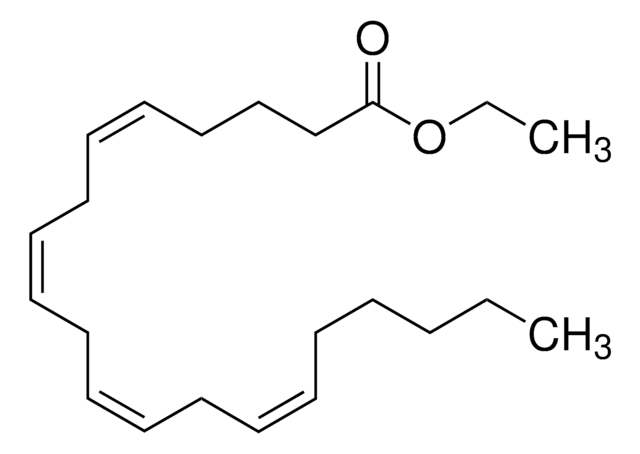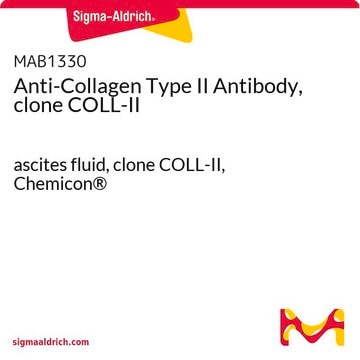推荐产品
生物源
rabbit
品質等級
抗體表格
affinity isolated antibody
抗體產品種類
primary antibodies
無性繁殖
polyclonal
純化經由
affinity chromatography
物種活性
human
製造商/商標名
Chemicon®
技術
ELISA: suitable
immunocytochemistry: suitable
immunohistochemistry: suitable
western blot: suitable
NCBI登錄號
UniProt登錄號
運輸包裝
wet ice
目標翻譯後修改
unmodified
基因資訊
human ... COL2A1(1280)
特異性
The antibody reacts with both native and denatured human collagen type II.
Cross Reactivity Percent
Human collagen type II 90%
Human collagen type I, III, IV, V <1%
Human plasma proteins do not interfere with binding to collagen.
Cross Reactivity Percent
Human collagen type II 90%
Human collagen type I, III, IV, V <1%
Human plasma proteins do not interfere with binding to collagen.
免疫原
Collagen type II extracted and purified from human cartilage.
應用
Anti-Collagen Type II Antibody detects level of Collagen Type II & has been published & validated for use in ELISA, WB, IC, IH.
ELISA 1:1000.
Indirect immunofluorescence on cryostat sections or cultured cells 1:10-1:20
Western Blot 1:100
Optimal working dilutions must be determined by the end user.
Indirect immunofluorescence on cryostat sections or cultured cells 1:10-1:20
Western Blot 1:100
Optimal working dilutions must be determined by the end user.
Research Category
Cell Structure
Cell Structure
Research Sub Category
ECM Proteins
ECM Proteins
外觀
Rabbit antiserum passed over agarose sorbents with immobilized human blood plasma proteins and human collagen types I, III, IV and V. Antibody was affinity purified on immobilized human collagen type II.
Product is liquid in 0.15M sodium chloride, 10mM sodium phosphate pH 7.5 with 0.1% mannitol and 0.1% dextran as stabilizers. No preservative.
Product is liquid in 0.15M sodium chloride, 10mM sodium phosphate pH 7.5 with 0.1% mannitol and 0.1% dextran as stabilizers. No preservative.
儲存和穩定性
Maintain at 2-8°C for up to 12 months from date of reciept. Remove any nondispersed aggregates by microcentrifugation prior to use.
法律資訊
CHEMICON is a registered trademark of Merck KGaA, Darmstadt, Germany
免責聲明
Unless otherwise stated in our catalog or other company documentation accompanying the product(s), our products are intended for research use only and are not to be used for any other purpose, which includes but is not limited to, unauthorized commercial uses, in vitro diagnostic uses, ex vivo or in vivo therapeutic uses or any type of consumption or application to humans or animals.
Not finding the right product?
Try our 产品选型工具.
訊號詞
Danger
危險聲明
危險分類
Repr. 1B
儲存類別代碼
6.1D - Non-combustible acute toxic Cat.3 / toxic hazardous materials or hazardous materials causing chronic effects
水污染物質分類(WGK)
WGK 2
閃點(°F)
Not applicable
閃點(°C)
Not applicable
Gabriella Nilsson Hall et al.
Biomaterials, 273, 120820-120820 (2021-04-20)
Tissue engineered constructs have the potential to respond to the unmet medical need of treating deep osteochondral defects. However, current tissue engineering strategies struggle in the attempt to create patterned constructs with biologically distinct functionality. In this work, a developmentally-inspired
Mu-En Lin et al.
Cardiovascular research, 112(2), 606-616 (2016-09-28)
Vascular smooth muscle cells (SMCs) are major precursors contributing to osteochondrogenesis and calcification in atherosclerosis. Runt-related transcription factor-2 (Runx2) has been found essential for SMC differentiation to an osteochondrogenic phenotype and subsequent calcification in vitro. A recent study using a
Hannah Agten et al.
Frontiers in bioengineering and biotechnology, 12, 1386692-1386692 (2024-04-26)
Osteochondral defects are deep joint surface lesions that affect the articular cartilage and the underlying subchondral bone. In the current study, a tissue engineering approach encompassing individual cells encapsulated in a biocompatible hydrogel is explored in vitro and in vivo.
Fu-Hui Wang et al.
Scientific reports, 12(1), 21663-21663 (2022-12-16)
The human type II collagen (Col II), specifically expressed in chondrocytes, is a crucial component of the adult hyaline cartilage. We examine the potential of artificial induction of Col II in human peripheral blood mononuclear cells (PBMNCs) as a novel
Gabriella Nilsson Hall et al.
Advanced science (Weinheim, Baden-Wurttemberg, Germany), 7(2), 1902295-1902295 (2020-01-30)
Clinical translation of cell-based products is hampered by their limited predictive in vivo performance. To overcome this hurdle, engineering strategies advocate to fabricate tissue products through processes that mimic development and regeneration, a strategy applicable for the healing of large
我们的科学家团队拥有各种研究领域经验,包括生命科学、材料科学、化学合成、色谱、分析及许多其他领域.
联系技术服务部门









